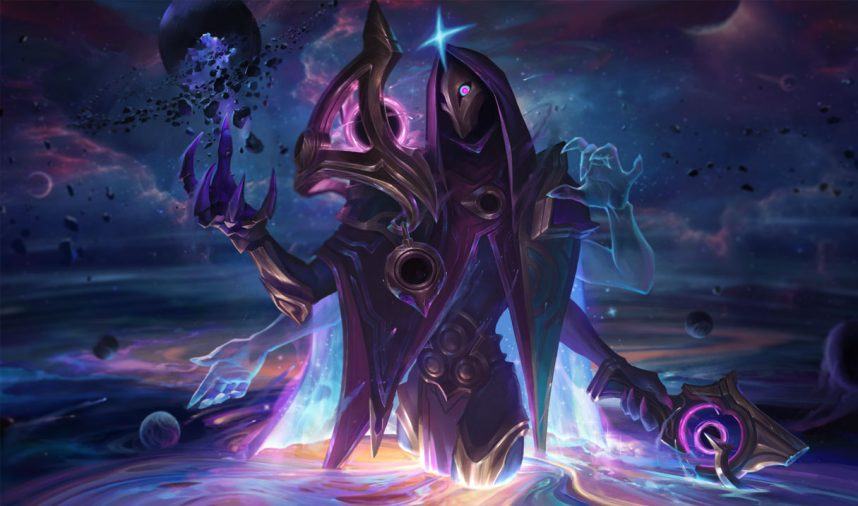Gambling Complaints Surround Latest Upgrade to Riot Games’ ’League of Legends’

Posted on: August 17, 2023, 07:46h.
Last updated on: August 17, 2023, 12:23h.
Fans of the highly popular League of Legends (LoL) video game aren’t happy with its developer, Riot Games. A new in-game skin being released is intrinsically tied to an established gambling system, meaning Riot apparently missed the memo about loot boxes and other in-game randomizers no longer being acceptable.

At the end of the month, LoL will include new Cosmic capsules, which are rewards for completing certain milestones in the game. Unless Riot changes how they work before then, gamers are threatening a global boycott.
The capsules give gamers the opportunity to pick up a particular skin known as the Dark Cosmic Erasure Jhin, which is a character in the game. The only way to get it is by purchasing a randomized capsule, not knowing what it contains.
Cap the Capsules
LoL players have been engaged lately in passionate debates about capsules. The reason behind this ongoing discourse is that these capsules can either provide valuable items or be a regrettable purchase.
The situation took a turn for the worse when the Public Beta Environment (PBE) data mine uncovered some disturbing information about the upcoming game capsules, set to be released in conjunction with the Cosmic 2023 event. It seems that these capsules may be adopting a gacha-like approach, leading to even more uncertainty and speculation among the player base. A gacha game is a video game that implements the gacha (toy vending machine) mechanic.
It's doomed guys.
30 Capsules to guarantee Erasure Jhin. 22500 RP. That's $200.
WE LOVE GACHA GAMING. I CAN'T WAIT TO GAMBLE AWAY MY KIDNEY FOR THE NEW 2044 JHIN SKIN.
HOLY FUCK BRO I HOPE THE BUSINESS EXECUTIVES AT RIOT CAN BUY THEIR 20TH MANSION!!!! pic.twitter.com/OLIcqpyypE
— I Keep It Taco 𓆏 (@IKeepItTaco) August 16, 2023
Similar to loot boxes, gacha games encourage players to spend in-game currency to receive random game items. Emily Lawrenson of Qustodio, a company that promotes responsible online interaction, describes them as “video games [that] encourage players to spend in-game currency for virtual items as they progress.”
In many cases, the items are randomized. This is where the debate begins over whether in-game loot boxes and other incentives should be considered gambling, as players pay for something without knowing what the outcome will be.
LoL players spoke up immediately after the data from the PBE was revealed. Initially, they expressed their willingness to purchase event passes and capsules as needed, but hesitated after witnessing the disappointing outcome.
The negative reception was so intense that some labeled this particular season as LoL’s most dreadful year. They’re also threatening to lobby for changes at the highest levels of government everywhere.
Microtransactions No Longer Welcome
What happens next is unclear. Riot hasn’t responded to requests for comments by media outlets, and apparently, isn’t keeping up with what’s going on across Europe and the U.S., where loot box controls are likely coming.
In order to safeguard players, particularly children, and to foster fair play, the UK gaming industry has implemented a comprehensive 11-step strategy to address loot boxes. The strategy involves implementing technological measures to block children from accessing them, initiating a widespread awareness campaign, and unveiling the existence of storage containers.
After an extensive three-year investigation, the UK government opted to advocate for self-regulation in the industry as a solution. The decision arises from the pressing need to tackle the matter adequately, with the microtransaction segment generating an estimated revenue of around $15 billion.
Belgium, the Netherlands, and Austria, among others, have firmly embraced a more robust approach. Diverging from the UK’s self-governing system, these have implemented more stringent limitations.
Belgium and the Netherlands have blocked loot boxes and similar incentives completely in their efforts to combat gambling addiction. They have firmly taken a stand to safeguard individuals, especially minors, from the detrimental effects of in-game purchases.
While not implementing a complete prohibition, Austria imposes stringent regulations on utilizing virtual currencies within secure storage areas. This is also meant to safeguard minors from excessive spending.
While different countries have adopted different approaches, there’s one constant. Almost all countries around the world are clamping down on the video game industry.
Related News Articles
Source: casino.org
